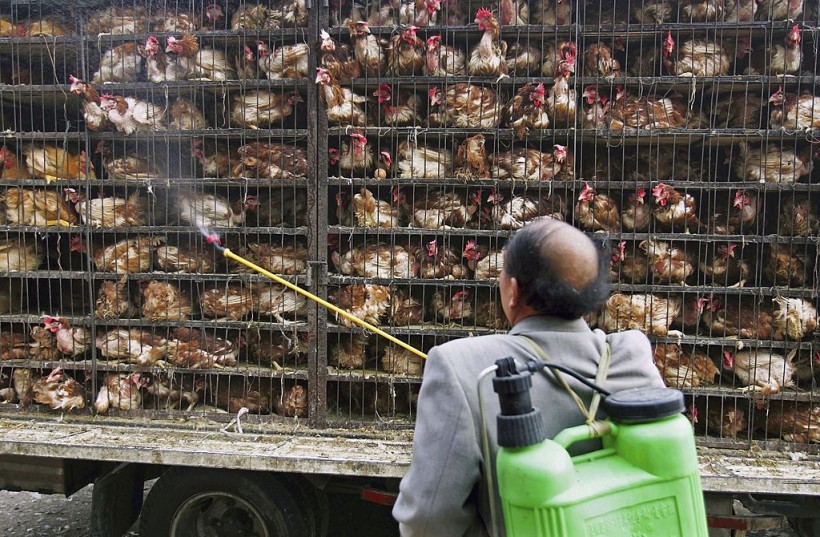A Colorado state jail inmate is the first person in the United States to test positive for the H5N1 avian flu-type circulating in birds worldwide.
The case comes as the highly contagious H5N1 bird flu sweeps the United States (per NPR), killing millions of birds. Although some birds have died due to the influenza strain, the majority are being culled to prevent the disease from spreading. Bird flu poses a low-risk to people.
After touching sick poultry at a farm in adjacent Montrose County, the guy, a prisoner at a state correctional institution in Delta County in western Colorado, tested positive for H5N1 flu, according to the Colorado Department of Public Health and Environment.
The man is isolating himself while being treated with the influenza antiviral medication oseltamivir. According to the agency, the danger to the public is negligible because this virus seldom infects individuals or spreads between people.
It is the second human case related to this category of H5 viruses; the first occurred in the United Kingdom in December 2021, CDC reported. According to the World Health Organization, the first patient lived among many H5N1-infected birds.
The CDC and the state health officials declared Thursday (via NBC News) that the virus's danger to individuals is currently minimal.

XINING, CHINA - MAY 4: (CHINA OUT) A worker disinfects chickens transported to a chicken slaughtering factory on May 4, 2006 in Xining of Qinghai Province, China. Surveillance has been stepped up in Qinghai Province following the discovery of a dead wild goose carrying the bird flu virus in Gangcha County. The Ministry of Agriculture said on April 30 that the dead bar-headed goose found in the county tested positive for the H5N1 strain, the highly contagious strain that has killed 12 people in China. Qinghai is known as a stopping point for migrating birds and the virus killed thousands of bar-headed geese at a nature reserve in the region in 2005, according to state media.
Bird Flu Explained
Bird flu, often known as avian flu, is a disease caused by a virus family that is mostly spread between birds.
H5N1 is the most common viral strain presently circulating. Birds disseminate it by releasing the virus in their saliva, feces, and nasal secretions, making it exceedingly infectious.
According to USA Today, the virus is propagated by wild birds. Still, it may also infect domesticated birds, resulting in large-scale epidemics.
There are two types of avian influenza viruses: low pathogenic avian influenza (LPAI) and highly pathogenic avian influenza (HPAI).
LPAI viruses produce minimal to no disease, CDC added. Still, HPAI viruses cause severe sickness and significant mortality rates in infected birds.
Bird Flu In the United States
Since late February, the current strain of avian flu, known as H5N1, has been spreading in the backyard and commercial chicken and turkey flocks across the United States. Viruses have been discovered in 29 states in commercial and backyard birds and 34 states in wild birds.
US Department of Agriculture said that more than 35 million hens and turkeys have been killed and removed to prevent the spread of the disease. USDA (via Live Science) added that farmers also culled at least 24 million birds as a preventive measure.
The Centers for Disease Control and Prevention (CDC) said it has followed the health of more than 2,500 humans who had been exposed to H5N1 virus-infected birds, but this was the first verified case.
CDC added that the man may have just had the virus in his nose and not the rest of his body. According to Colorado public health officials, repeated influenza testing on the individual was negative. A positive nasal swab test result matches the agency's requirements for diagnosing an illness.
"The appropriate public health response at this time is to assume this is an infection and take actions to contain and treat," the CDC statement (via Los Angeles Times) said.
RELATED ARTICLE: Burkina Faso Bird Flu Outbreak: 500,000 Chickens Die Due to H1N1 Strain
Check out more news and information on Medicine and Health in Science Times.



![Earth's Quasi-Moon Kamo‘oalewa Could Originate From Lunar Surface Not Asteroid Belt [Study]](https://1721181113.rsc.cdn77.org/data/thumbs/full/53275/89/56/50/40/earths-quasi-moon-kamo-oalewa-could-originate-from-lunar-surface-not-asteroid-belt-study.png)










